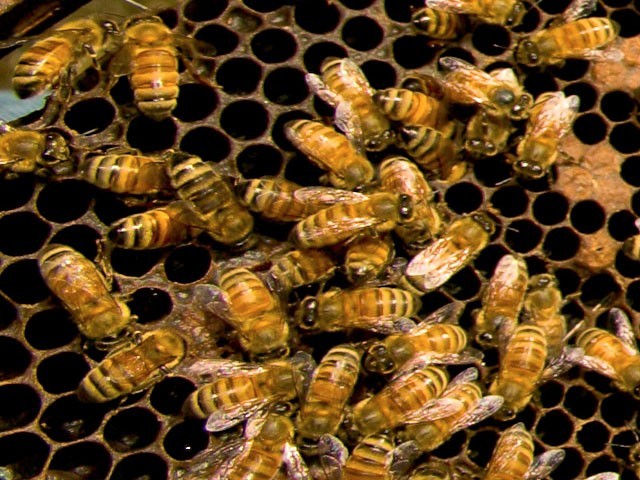ATHENS, Ga. (AP) - Long past are the days in which British royalty knighted nobles for their services in battles.
Recently, though, a British ambassador inducted a University of Georgia professor into a chivalric order for his struggle to halt the demise of bees.
UGA researcher Keith Delaplane for years has studied bees and the reasons the possible reasons behind their population decline.
The entomology professor conducts that research so well it recently earned him induction into the Most Excellent Order of the British Empire.
White-gloved British Ambassador to the United States Sir Peter Westmacott did the induction honors last month at the British embassy.
Don't call him Sir Keith, though.
The title doesn't entitle the member to the appellation ``Sir'' or ``Dame.''
Three other Americans were also inducted in the ceremony, held at the British embassy in Washington, D.C., beneath an Andy Warhol painting of Queen Elizabeth, Delaplane said.
One was a Syracuse University professor who helped the village of Lockerbie, Scotland, recover after a terrorist bomb sent an airliner crashing into the little village, killing 259 people in the plane and 11 more on the ground.
A Marine helicopter pilot who rescued two British soldiers was another inductee. Delaplane's honor was ``for services to beekeeping,'' which is no small thing.
There's barely any human endeavor not touched in some way by a need for bees, and Delaplane is one of the world's leading authorities on honeybees.
For the past several years, he's been one of the leaders in a global effort to solve the mystery of so-called ``colony collapse disorder,'' which has wiped out thousands upon thousands of honeybee hives.
Much of the world's agriculture depends on solving that mystery, especially in the United States.
``It's the factory pollinator for factor-scale agriculture,'' Delaplane said of honeybees. ``They are the only manageable pollinator at an American scale of agriculture.''
Recently, he's been exploring commercial honeybee breeding practices and has uncovered evidence that he hopes will take bee breeding in an entirely new direction.
Breeders have been trying with limited success to select specific traits such as honey production or resistance to the Varroa mite - suspect No. 1 in colony collapse disorder.
But that's the opposite way to go with bee colonies, which are what scientists call a ``superorganism,'' Delaplane explained.
The hive's honey is like fat, a stored-up food supply; the bees' group decision-making is like the brain; and beeswax is like the liver of a single animal.
The unit of natural selection with bees is the hive, not the individual, and hives strive for genetic diversity, he said.
When Delaplane experimented by introducing more genetic diversity into hives instead of trying to narrow it, he found that everything improved - resistance, honey production and general hive health.
``I think we're barking up the wrong tree,'' he said. ``You can't do it like other animals. The colony resists genetic narrowing.''
Delaplane has been doing research and working with British beekeepers for more than a decade. He suspects two of his contributions probably helped garner him his new membership in the Most Excellent Order of the British Empire.
Working with Britain's National Bee Unit, or NBU, he helped convince the organization to expand from basically a regulation and inspection unit to add a research arm. He also helped establish an annual beekeeping institute in Northern Ireland, bringing in speakers from all over the English-speaking world, he said.
The institute is a sister to an institute Delaplane coordinates here in Georgia - the UGA-Young Harris College Beekeeping Institute.
His years of working in Great Britain have infused a few Britishisms into Delaplane's vocabulary, such as the occasional ``bloody.'' But he had no idea he would be inducted into a chivalric order.
``That was a bolt out of the sky,'' he said. ``I had no idea that was in the works.''
The embassy notified him last summer, but he was sworn to secrecy, he said.
Delaplane won't soon forget the induction ceremony.
``I was just blown away by how they made me feel,'' he said.
Now Delaplane's back at work in Athens, working on the Varroa mite mystery and trying to get breeders to embrace genetic diversity as a partial solution.
Varroa mites have been around since 1987, but colony collapse disorder wasn't a big problem until recent years, he said.
That may be because we've reached some kind of environmental threshold, he said.
Land where honeybees can forage for pollen has declined, and pesticides have become ``absolutely ubiquitous'' in the environment.
An invasive parasite, Varroa mites leaves wounds on honeybees, which can easily become infected.
With Emory University scientists, Delaplane has now begun an experiment to see if the parasite grows more virulent when it's in high concentrations. He suspects that it does.
``If you've got lots of hosts, you don't have to be a kind and gentle parasite,'' he said.
Wild bee populations are also in trouble, Delaplane said. Some species haven't been found in Massachusetts since the 1990s, he said, and some in the West may also be extinct.
Homeowners can help wild bees, which Delaplane said are the best pollinators.
One way is to install in yards small bee habitats, available at garden stores, for solitary bee species. Another is to encourage pollination with plants that flower when others don't, such as crape myrtle and sunflowers.
Monday
August 25th, 2025
4:49PM









